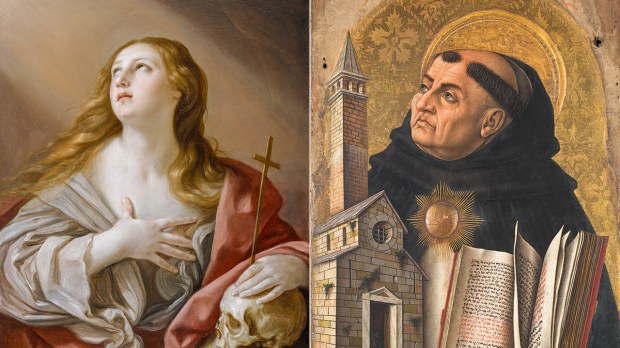St. Mary Magdalene appears in a few places in the Bible, though her most prominent mention is immediately following the resurrection of Jesus in the Gospel of John.
St. Thomas Aquinas reflects on this passage in his commentary on the Gospel and states that she was given three honors or “privileges” in this encounter.
Notice the three privileges given to Mary Magdalene.
First, she had the privilege of being a prophet because she was worthy enough to see the angels, for a prophet is an intermediary between angels and the people.
Secondly, she had the dignity or rank of an angel insofar as she looked upon Christ, on whom the angels desire to look.
Thirdly, she had the office of an apostle; indeed, she was an apostle to the apostles insofar as it was her task to announce our Lord’s resurrection to the disciples. Thus, just as it was a woman who was the first to announce the words of death, so it was a woman who would be the first to announce the words of life.
John Paul II
St. John Paul II also saw these special honors given to Mary Magdalene, reflecting on them in his apostolic letter, Mulieris Dignitatem.
Hence she came to be called “the apostle of the Apostles.” Mary Magdalene was the first eyewitness of the Risen Christ, and for this reason she was also the first to bear witness to him before the Apostles. This event, in a sense, crowns all that has been said previously about Christ entrusting divine truths to women as well as men. One can say that this fulfilled the words of the Prophet: “I will pour out my spirit on all flesh; your sons and your daughters shall prophesy” (Jl 3:1).
It should not be surprising that the Church celebrated Mary Magdalene’s memory with great solemnity and the Church has restored that honor once again, elevating July 22 to the rank of a “feast.”


